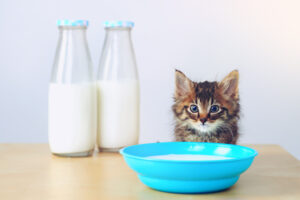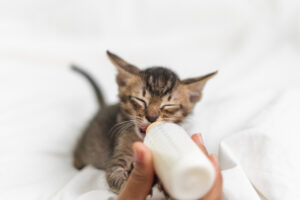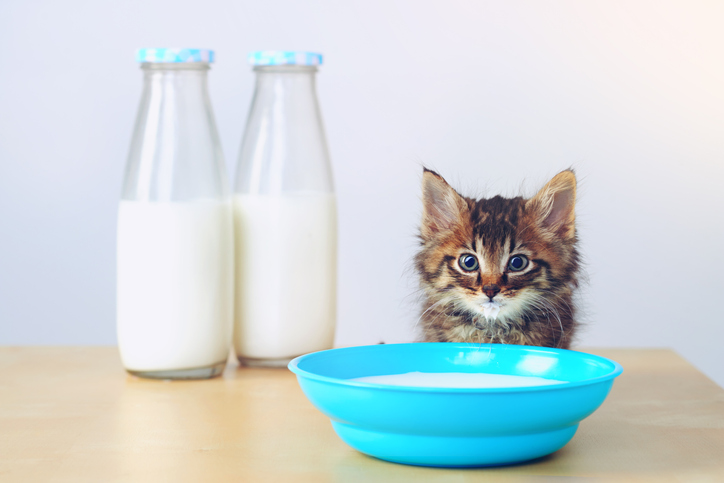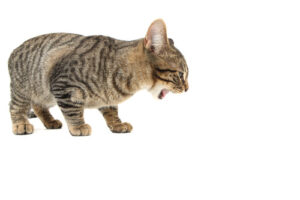Can Cats Drink Milk?
Have you ever wondered if treating your cat to a bowl of milk would be a good idea? There are so many vintage photos and famous 19th-century Victorian paintings of cats who can be seen lapping up saucers full of milk.
The traditional belief that milk is suitable for cats is false. Cats only require milk when they are kittens and are nursing off their mother. While some cats continue to drink milk throughout their lives and enjoy it, it can cause them to miss out on critical nutrients and may lead to obesity.
There may be some wiggle room in your cat’s diet to allow them to drink milk every once in a blue moon, but it should not be a staple in their everyday diet. If you have more questions about whether cats should drink milk, you have come to the right place.

Lactose and Cats
Milk contains an ingredient called lactose, which is the sugar that is naturally present in milk. Lactose can be found in the milk of all mammals. This finding includes animals like cows, goats, and of course, cats. The assimilation of lactose occurs within the small intestine and is enabled by the lactase enzyme. To be able to break down lactose effectively, the body must be able to produce lactase.
Are Cats Lactose Intolerant?
Most cats do not produce lactase, rendering them incapable of adequately digesting the lactose in the milk. Like in human infants, when cats are babies, their lactase production is at its highest. Kittens produce enough lactose to drink their mother’s milk when they are born, and felines require their mother’s milk to receive all the necessary nutrients for vigorous growth.
When kittens are between four to six weeks of age, they stop producing enough lactase to be able to digest their mother’s milk, and they wean off the milk and start to eat solid food. It is likely at that point; the growing kitten has become lactose intolerant. In most cats, drinking milk precipitates all kinds of digestive problems.
Complications that Can Result from Cat Drinking Milk
Just like how cats are sometimes enticed by dairy foods like cream cheese because they can smell the fat and protein, cats are drawn to milk for the same reason. Many cats are attracted to dairy products even though they cannot successfully digest them, and plenty of cats love milk. However, many problems can result from your cat drinking this cold, creamy substance:
- Bloating
- Vomiting
- Diarrhea
- Obesity
- Excess gas
- Stomach pain
Milk can give a cat an upset tummy. Cats allergic to milk may also develop red or itchy skin from drinking it. However, since milk has protein and calcium, a little drop of milk or two once in a while will not likely harm cats. Cats who do not respond well to dairy may like lactose-free milk as a treat. As a general rule, you should never replace water with milk as your cat’s primary beverage.
Milk Options for Cats
Even if your furry feline appears to have a tolerance for milk, it does not mean you should allow them to have it in their regular diet. In general, milk does not support your cat nutritionally. Consumption of milk can lead to horrendous diarrhea and inhibit the addition of vitamins and minerals.
However, some pet parents may give milk as an occasional treat. Knowing what types of milk are available and the potential risks are essential. Below is the rundown on the different kinds of milk and the hidden dangers or benefits for your cat.
Skim Milk
Some cats tolerate a minimal amount of milk, but you must be careful. Even though there is the traditional belief that cream is a delight for any animal of the feline persuasion, it is not a good idea. It is packed with fat and sugar, and neither is suitable for cats. If you insist on giving your cat dairy milk, ensure it is skimmed.
Some vitamins in skim milk include:
- Calcium
- Vitamin D
- Potassium
- Vitamin B-12
Even with the benefits of milk, giving cats more than a small quantity now and then as a treat is irresponsible. Unless your feline is one of the few who are able to tolerate milk, they should not have it. Cats not lactose intolerant may have issues with casein, which is a milk protein.
Milk Without Lactose

Lactose-free milk is a significantly safer substitute for felines. There is a product named Cat-Sip, a vacuum-packed lactose-free one percent milk alternative containing taurine, an essential amino acid for cats. Cat-Sip is real cow milk that has been specially formulated not to trigger digestive upset in cats.
This special cat milk includes the enzyme lactase, which allows your cat to slurp freely without suffering the harsh consequences that usually occur after they drink regular milk. Many pet parents have tried this product, and the consensus is that it appears to satisfy kitty cravings.
Goat Milk
Goat milk has considerably less lactose than cow’s milk, which means it can be safer than regular milk. It contains oligosaccharides, which have probiotic benefits, as they support the growth of healthy gut microflora. They also help decrease gastrointestinal inflammation. Goat milk may help alleviate any irritation caused by inflammation. It balances and enhances the gut microbiome.
Some other benefits of goat milk are:
- Calcium
- Magnesium
- Potassium
- Phosphorus
- Protein
- Iron
The probiotics in goat milk can help improve your cat’s immune system. Goat milk has probiotics and prebiotics that can enrich your cat’s overall health. However, just like skim milk, you need to use it sparingly. A small quantity as a rare treat may be tolerable.
Soy Milk
Cats cannot digest the carbohydrates in soy milk and should not have soybeans. Plant-based proteins are a no-no for them. Some cats are allergic to soybeans. Soy contains a compound that prevents the absorption of minerals and blocks the enzymes required to digest protein safely. It can also cause hyperthyroidism in cats. Some of the symptoms of hyperthyroidism include:
- Weight loss
- Increased appetite
- Elevated heart rate
- Poor coat condition
Hyperthyroidism may also trigger extreme thirst in cats, as they will likely drink more water than average and urinate more frequently. Cats who ingest soy may develop these symptoms, and it is not safe to give them this protein. It may also cause liver damage or failure.
Almond Milk
Almond milk does not contain lactose and can be safer for cats than dairy milk. It also has omega-3 fatty acids, which are heart-healthful fats for felines, just like in humans. It is also low in carbohydrates, and if you give them unsweetened almond milk, it will not affect your cat’s blood sugar.
Almond milk has similar benefits as dairy milk. However, it should take something other than water or appropriate feline nutrition. Giving your cat almond milk as a once-in-a-while treat is purrfectly acceptable.
Conclusion
Milk is generally not suitable for cats. It causes gastrointestinal problems, as cats cannot properly digest lactose. If you feel you must give your feline companion a taste now and again, give them a small amount as a treat.
Some other options for your cat, such as lactose-free milk, specially made for your furry feline, and almond milk, are safer for them, but only in moderation. Otherwise, please do not give your cat something that can be dangerous for them and may harm their health.
Do you have any additional questions regarding your cat and milk consumption? Triangle Animal Clinic in Conroe, TX is here to help! Give us a call at (936) 756-3318 or make an appointment online today!





